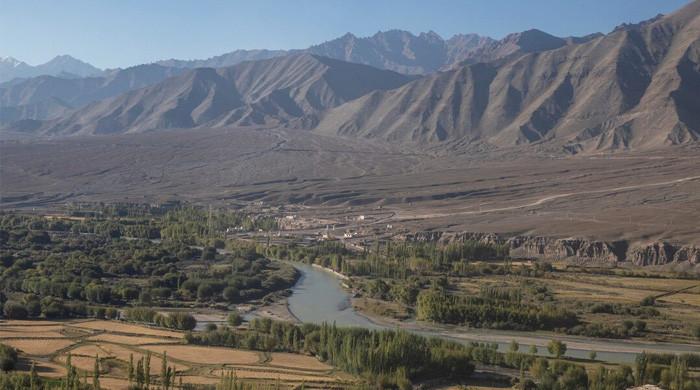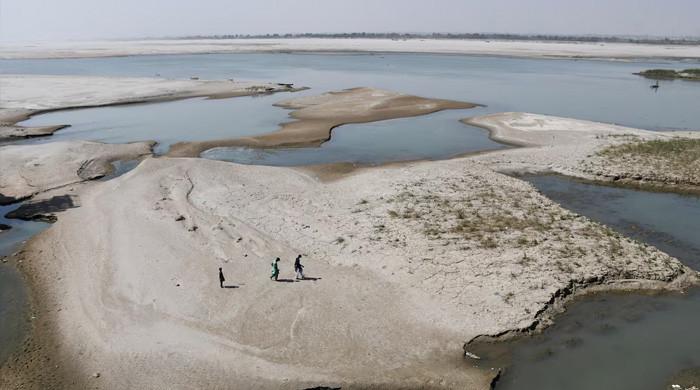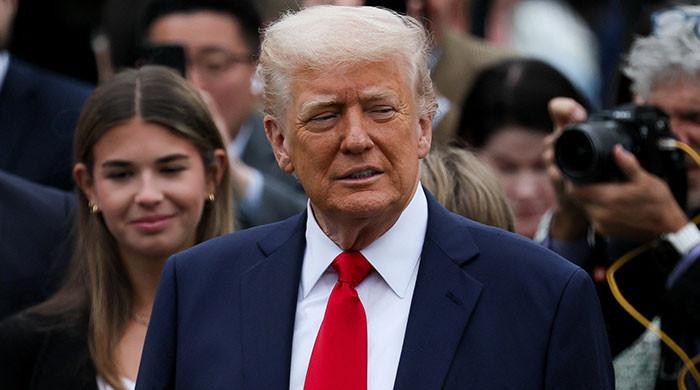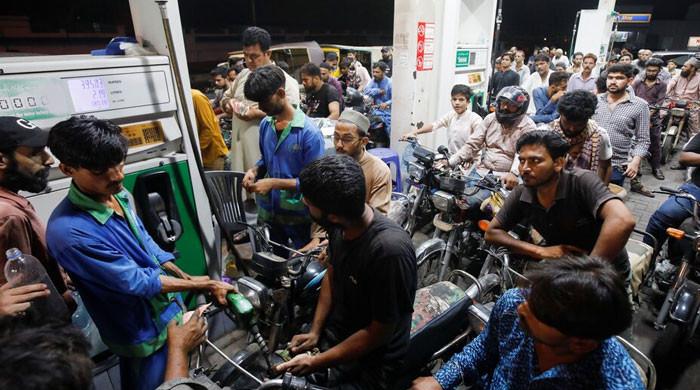The budget as an enemy weapon
New budget represents a weapon that Pakistan's enemies never paid for and will never have to fire
July 02, 2024
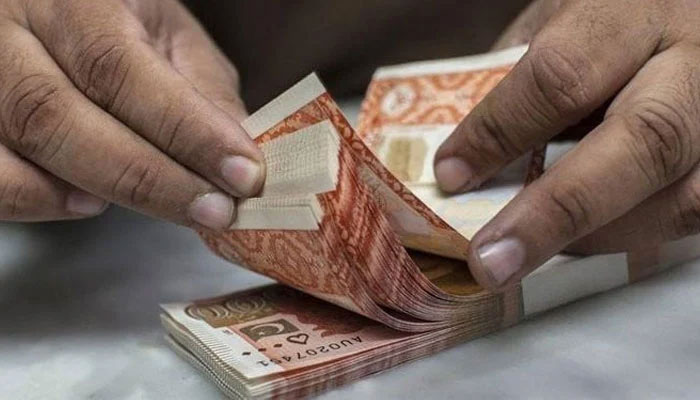
"Pakistanis are being forced to tighten their belts to make up for several years of irresponsible economic management, which has left public finances in a mess." This was the opening paragraph of an article by the legendary Farhan Bokhari in the Christian Science Monitor published on September 1, 1993.
The Pakistani baby that was born when those words were written is now 30 years old. Just stop to imagine what this 30-year-old feels today as she or he consumes all the opening paragraphs of all the articles being written about all the economic "reforms" that are necessary today because of "irresponsible economic management" of the past.
The 30-year-old baby is not alone. Pakistan's total population in September 1993 was around 125 million. For every one Pakistani that welcomed our 30-year-old baby to the world in 1993, there are now two. The one Pakistan of 1993 is two whole Pakistans today. So the angst and anger she or he is feeling is felt by at least twice as many souls.
It gets worse. In 1993 the nature of the crisis was fathomable. The country had been partitioned just 22 years earlier. That trauma and shock was followed by two major geopolitical earthquakes: the revolution in Iran and the Soviet invasion of Afghanistan.
By 1993, dusty, young Pakistan was still relatively young – as a state, a country and an idea. It was reeling, but the quantum of challenge it faced was fathomable. Total external debt in 1993, for example, was $24 billion. Today it is well over $126 billion. So, double the population but five times the external debt.
In that same article, Bokhari wrote: "Despite domestic criticism, there is a good chance that the reforms will remain in place. The recent measures have already been welcomed by the International Monetary Fund in Washington.
The IMF has just announced a $350-million standby loan facility for Pakistan, and Pakistani officials are hopeful that a further three-year loan of $1 billion will be announced once a new government comes to office in October. The conditions attached to the loans are considered to be the most important assurance that a future government will not reverse Qureshi's reforms."
As it turned out, we didn't need to wait till 2024 to figure out that the caretaker government of 1993 would not be able to deliver the "reform" platform for the new elections to make a meaningful difference. Neither did the election solve the rapid descent of the economic situation, nor did the "reforms" Moeen Qureshi brought in have any endurance.
In the late November 1996 issue of Asiaweek magazine, Susan Berfield and Shahid ur Rehman wrote an article about Pakistan's economy titled, "In Need of a Miracle". Three years earlier, a different World Bank vice-president had promised reform and failed.
By 1996, a new vice president had arrived to save the day. Here is how the new "miracle man" was described by Berfield and Rehman in Asiaweek:
"Burki presented his master plan — he called it a 'revolutionary economic reform package' — a mere five hours after he was sworn in as de facto finance minister November 9. He has promised that in the 90 days before elections on February 3, 1997, he will revive an economy that is chronically unfit."
As I read reporting from the 1990s this week, trying to find some historical basis for optimism about what may be possible after the catastrophic budget that the government has just passed, I was struck by the utter absence of any grounds for optimism.
Every sentence, about every supposed reform, has already been written. Every charlatan, representing every possible special interest, has already spoken. If you are a salaried Pakistani, whatever differences there may be between the catastrophic handling of Pakistan in the 1990s and the farce of today will not matter much.
The only thing that really matters is the stinging realisation of just how little regard your country's ruling elite have for you. And the helplessness of knowing just how little control or agency you have in changing things.
This alone should be grounds for an aggressive, urgent and fearless series of government actions. A disenchanted, disenfranchised, and angry salariat is dangerous. Urban discontent among the most capable segment of the population not only represents potential instability, but it breeds the cancer of deeply held resentment.
Young Pakistanis becoming disengaged from the idea of their country – because they believe they are powerless to change it for the better – is a greater strategic and tactical defeat than anything Pakistan's enemies can throw at the country.
The short-term problem of a wild and unencumbered populism – in the shape of what Imran Khan has come to represent – has been and is being tackled in a manner that guarantees a more profound, more insidious medium- to long-term problem.
If the evidence of what passes for political expression by young people online wasn't enough, and the ease with which May 9 was enacted wasn't enough, and the February 8 election turnout and real result wasn't enough – what will be? Perhaps nothing can convince the powers that be of the importance of listening to the voice of the people. But evidence continues to mount.
The latest signal is how a politician as readily engaged by the system as Maulana Fazlur Rehman has always been is turning away from engagement with the authorities and leaning into what he clearly believes is the ascendant sentiment of Pakistanis.
Listening to Maulana with the video off and ignoring the different accents and linguistic patterns, you would be hard-pressed to tell the difference between speechwriters of the PTM and speechwriters for the JUI-F.
The most dominant political party in the northwest of the country – across provincial and traditional lines – is the PTI. But the language and symbolism that all parties in the northwest are adopting is strikingly similar. The linguistic and ethnic undercurrent is one that has always irked the Pakistani Main Street. But this time, there is something even more worrying brewing down in the heartland.
When PTI and PTI plus leaders in Punjab now speak to the issues within the party, there is a growing tendency to address the different ways the party faithful feel they are being treated. In Khyber Pakhtunkhwa, the party has faced stiff state pressure, but its cadres live in a province where their elected leaders are, by and large, the ones running the province.
In Punjab, the disequilibrium between what PTI voters thought they had elected, and what they have gotten instead is palpable. Increasingly, this disequilibrium finds its way into the rhetoric of party leaders in Punjab.
They claim that they have faced oppression of a totally different nature to the PTI cadres in the northwest of the country – but this claim is being made against a populace that has lived either directly, or in the shadow of war, for four and a half decades.
These differences are not subtle or small. They are exacerbated and deepened by wider economic and social pressures. Today is Day Two of the new fiscal year – petrol and diesel prices have just increased. Electricity tariffs are next.
Soon after, there will be larger chunks of cash that high-end salaried folks are going to have to say goodbye to. Their collective angst will be channelled into the pre-existing narratives adopted by those they feel proximate to.
The differences between the 1990s and today aren't unsubstantial. Demography, technology, and climate are the triple threat that makes economic weakness much, much worse.
Less spoken of, but even more relevant is the perceived weakness of a country surrounded by extremist regimes, or wider geopolitical contestation on all sides: the Taliban to the northwest, IRGC to the west, RSS to the east, the Indo-Pacific theatre on the seas, and China to the northwest.
In the 1990s, Pakistan used to spend a quarter (25%) of its total budget on national security. In the last decade, military expenditure has been squeezed, not by prudence or peacemaking, but by debt servicing. On average, Pakistan now spends around 17% of its budget on arming itself to deter external aggression. Rest assured, absent real economic reform, this percentage will keep reducing.
Pakistanis that argue for diminished national defences have the luxury of making their silly arguments from within the cocoon of safety afforded to the Islamabad-Lahore-Karachi conclave of elite opinion-making. But Pakistan's enemies see the opportunity in what the last few years of internecine warfare among the Pakistani elites is doing to the country's survivability.
By forcing the Pakistani salariat into a defensive crouch that may alienate them from the state for the medium to long term, the new budget represents a weapon that Pakistan's enemies never paid for and will never have to fire. But one whose echo will endure.
The writer is an analyst and commentator.
Disclaimer: The viewpoints expressed in this piece are the writer's own and don't necessarily reflect Geo.tv's editorial policy.
Originally published in The News





